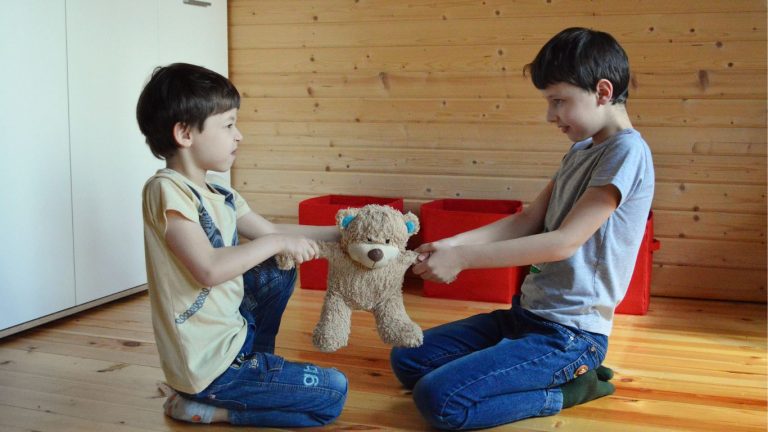One of the toughest parts of parenting young children is dealing with sickness and illness. From the age of around 6 months to 6 years children present with a whole host of illnesses and disease. Find out about the 10 most common childhood illnesses.
These common toddler illnesses can present from the very mild to the potentially life-threatening. Many can make your child really miserable, although cause them no long term harm. In fact, various studies suggest that a child’s immune system can be improved from catching some of these viruses.
But even the most mild fever, or upset tummy, can quickly turn into a serious event. All of these illnesses can be treated at home, but if you have any concerns about your child’s health seek medical attention right away.
ALWAYS err on the side of caution when it comes to your toddler’s health.
What are the 10 most common childhood illnesses?
1. Croup
2. Ear infection
3. Fever
4. Gastro
5. Hand, foot and mouth
6. Flu
7. Pneumonia
8. Roseola
9. Slap Cheek
10. Sore throat
Croup
Croup is a fairly common childhood complaint and is caused when a virus causes swelling in the trachea (windpipe) and larynx (voice box).
Croup is easily recognised due to the distinctive cough that it causes; it has been likened to the bark of a seal. This cough is caused by air passing through the swollen vocal cords.
Ear infection
An ear infection is one of the most common of childhood diseases. Around one in six children will suffer from an ear infection in their first year of life.
Such infections are particularly common in children because the tube that connects the middle ear to the throat is narrow, which can cause blockage and, in turn, infection.
Fever
A fever is a raised body temperature (its medical name is pyrexia).
Normal temperature is 36 – 37ºc so fever is a temperature above this range, although it is significant when it is higher than 38°c and dangerous when it is above 40°c.
Gastro
Children have an amazing ability to become sick very suddenly and then, after appropriate treatment, make an amazingly fast recovery to full health.
Gastroenteritis – or gastro – is one of these ‘get sick quick, get well quick’ conditions. Gastroenteritis means an inflammation of the lining of the stomach and intestines and it presents in children primarily as vomiting and/or diarrhoea.
Hand, foot and mouth
This is a relatively common virus infection that is not related to the hand, foot and mouth disease that occurs in cattle.
Hand, foot and mouth disease is usually caused by the coxsackie A16 virus and generally infects children under 10 and especially preschool children.
Flu
Influenza, or the flu, is common and often nasty. Influenza makes you feel generally unwell, miserable and want to stay in bed.
The flu can also cause upper respiratory symptoms such as coughs and a blocked nose as well as sore throats, sore ears and sore sinuses, along with fever and chills.
Pneumonia
Pneumonia is an infection of the lungs and respiratory system. It causes inflammation and the normal air sacs of the lungs (alveoli) become filled with fluid.
Pneumonia can range in severity from a mild illness to one that is potentially life threatening.
Roseola
Roseola, otherwise known as sixth disease is a very common infection caused by the herpes group of viruses (the same group that causes cold sores and chickenpox).
It most often affects children between 6 months and 2 years old, and begins with a high fever followed by a rash after 3 – 5 days.
Slap Cheek
This viral illness gets its name from the characteristic ‘slap like’ rash that appears on children’s faces.
Slap Cheek is now known as Parvovirus and is also called Fifth Disease (because it was the fifth childhood infection with rash-like symptoms children usually get). It may also be referred to a its Latin name Erythema Infectiosum, which means infectious rash.
Sore throat
Sore throats are part and parcel of life with children – they are normally a mild condition, caused by a virus, that passes in a few days.
Sore throats can be part of a cold or flu, or be part of more serious conditions such as glandular fever. Approximately 1 in 5 sore throats are caused by the streptococcus bacteria, known as strep throat.
What are the 6 most common childhood diseases?
You may have heard of the 6 common childhood diseases. We mention one of them above, Slap Cheek or Fifth Disease.
These common, and very contagious childhood diseases tended to present in the same order for many children. 100 years ago, it was a bit of a gauntlet getting through each of these diseases, and many were fatal for weaker children and babies. Occasionally they still are.
But many of these diseases are becoming more rare in most countries, due to immunisation programmes and stronger immunities. Although some of these viruses tend to flare up every now and then, others such as Rubella are almost extinct in a lot of countries.
In order, the six common childhood diseases are: measles (first), scarlet fever (second), rubella (third), Dukes’ disease (fourth), Slap Cheek (fifth) and roseola (sixth).
What are the 6 deadly childhood diseases?
- measles
- tetanus
- whooping cough
- tuberculosis
- polio and
- diphtheria
If you are at all concerned your child may have one of these diseases. Or if you’re treating your child at home, and they become very unwell, or unresponsive. Trust your instincts and take your child to your GP, physician, or local hospital.
It is ALWAYS best to err on the side of caution when it comes to your child’s health.
For more expert health advice, see our Health and Wellbeing section.















